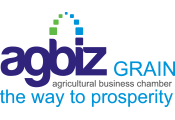
BLOG
The greater purpose

My first step into grain handling and storage was at MKB (now part of Overberg Agri) in Moorreesburg, Western Cape more than 20 years ago. As a young agriculturalist, I was assigned to take dust samples in the silos as part of a Southern African Grain Laboratories (SAGL) project to monitor the silos for karnal bunt. I not only got to know the darkest crevices of a silo, but developed a passion for this wonderful industry. From there, my path in grain administration and marketing led to me overseeing the grain division at MKB.
NWK in Lichtenburg was the next stop on my grain journey, where I was the regional manager and responsible for compiling the budgets of the grain handling division. Silobags, bunkers, and dams became an alternative method of storage at the beginning of the 21st century. I learned more about these storage methods at Suidwes Landbou in Leeudoringstad, where establishing new depots was part of my responsibilities.
The past six years I spent working outside the grain handling and storage sector, allowing me to look at grain handling and storage from a different angle while not directly involved in it. I was involved with various non-profit organisations during this period and learned a lot about the concept of the ‘greater purpose’. The greater purpose can be defined as the main reason to live or exist. It involves going beyond your personal needs and using your gifts, expertise, and resources to benefit others and contribute to the bigger community, the country, and the world. I believe that grain handling is more than simply having a job, and ensuring that grading and fumigation are conducted correctly, all while delivering a profit at the end of the year.
Grain handling and storage have a greater purpose, including the following:
Providing for the tougher years Covid-19, the war in Ukraine, and the unstable political situation in the Middle East have underscored the importance of preparing for unforeseen events. This principle was applied by Joseph in biblical times, when grain was stored for seven years of famine. Hence, the first aspect of the industry’s greater purpose is to store grain for the tougher years and ensure a continuous supply.
Food security
While working for Collateral Management International (CMI), a subsidiary of AFGRI in Rwanda, I became acutely aware of the impact of post-harvest losses, with between 20 and 40% of harvested grain lost due to insects, rodents, or spoilage. The second greater purpose aspect of the industry is focussed on the safe handling and storage of grain, which significantly contributes to the availability of grain, the profitability of farming operations, and food security.
Supporting grain trading
Commercial grain storage creates and maintains an effective marketing environment by guaranteeing the quality and quantity of the grain delivered to the facility. The third important greater purpose element is therefore to support the grain trade by providing peace of mind to both the seller and buyer that the grain will be handled and stored safely, and will be available on demand.
Traceability, environmental impact The pursuit of the greater purpose occurs within a changing business environment. It is becoming increasingly important for consumers to know where and how their food is produced, stored, and manufactured. Traceability within the grain handling and storage sector, where big quantities of grain from various producers are handled together, is probably a greater challenge than, for example, the fruit or meat industry; however, it will likely become more important in future and will have to receive more attention. The same applies to environmental aspects, including fumigation, the handling of chemicals, and the impact of grain storage facilities on the surrounding environment. People are essential to the operation of storage facilities. Initiatives such as training the next generation of staff and developing auditing standards relating to health and safety will require further development.
Looking forward
My next season in the grain handling and storage sector starts on 1 May, when I take responsibility for the Agbiz Grain Desk. I am excited to be part of this unique family again and to contribute to the sustainability of the greater grain sector. The members of Agbiz Grain are also our clients.
My priority will be to understand the challenges and needs at the depot/facility level, to represent the industry, and provide a service that is on standard and on time, ensuring a return on their investment.
By Dr Charl van der Merwe, newly appointed general manager of Agbiz Grain.

0 COMMENTS
LEAVE A COMMENT